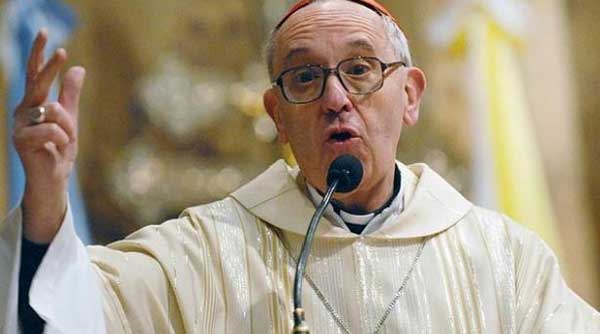Jesuit Jorge Mario Bergoglio is the new Pope
The Jesuit Jorge Mario Bergoglio from Argentina is the new Pope of the Roman Catholic Church. Francis I. is the first Jesuit in the papal office and also the first non-European.
The Roman Catholic Church experienced a double premiere: for the first time in history there is a Pope who comes from South America. And for the first time a member of the Jesuit order holds the highest ecclesiastical Office. The Argentinian Jorge Mario Bergoglio was elected Pope on Wednesday evening in the fifth round of votes. Until now, the 76-year-old had been the Archbishop of Buenos Aires. Bergoglio’s name as Pope is Francesco (Francis), he is the first Pope who has chosen this name.

Supposedly second in 2005
Bergoglio is a surprise for most Vatican experts, although he had, according to a “diary” which in 2005 had been smuggled out of the Conclave by one of the Cardinals, received the second most votes after Joseph Ratzinger. His withdrawal paved the way for the later Pope Benedict XVI., the document says.
Like many of his compatriots, the new Pope holds both the Argentine and the Italian citizenship and speaks Spanish and Italian, additionally some German due to a sojourn in Germany, were he wrote his doctoral thesis in 1985. The graduate chemist is regarded a multi-talent – good cook, opera lover, friend of the Greek classic, Shakespeare and Dostoevsky, good swimmer and strong, although he is struggling with lung problems since his childhood.
Bergoglio is considered a modest, down-to-earth and ecologically-minded person. As the “Cardinal of the poor”, he uses mostly public transportation and waived episcopal splendor. He confirmed this impression in his first appearance on the balcony of the St. Peter’s Basilica.
Modest appearance
“Brothers and Sisters – Good evening,” the newly elected Pope greeted the faithful in St. Peter’s Square. Dressed with only the white cassock without the stole he had appeared on the balcony of St. Peter’s Basilica. With his first words he thanked all participants for their attendance and described himself as Pope “from almost the end of the world”. A moment later, he asked for prayer for his predecessor, the retired Pope Benedict XVI., for whom he prayed the Our Father and a Hail Mary.
The church is a way of brotherhood and love, the Pope said. “Let us pray for each other, and let us pray for the whole world,” so his call, followed by a bow in silence, and finally the apostolic blessing “Urbi et orbi”, after the Pope had put on the stole reserved for him alone. He ended his speech with the words: “Good night and sleep well.”
Son of Italian immigrants
Bergoglio was born on December 17, 1936, as the son of Italian immigrants. His father was a railway employee in the Argentine capital. There, Bergoglio went to a technical school. At the age of 21, he entered the seminary and joined the Jesuits.
Shortly after his ordination in 1969, he became provincial of his religious order in Argentina (1973). Later as Professor of theology, he was appointed Archbishop coadjutor of Buenos Aires in 1992, and Archbishop in 1998. In 2001 Pope John Paul II. appointed him Cardinal.He was further member of the Latin American Commission, the Family Council, the Congregation for Divine Worship and the Discipline of the Sacraments and the Congregation for Religious.
Moderate and open to dialogue
Theologically, Bergoglio can be classified as moderate and open to dialogue, moreover he is also close to the conservative and socially active movement „Communione e Liberazione “Communion and Liberation). His relatively few words carry weight in traditionally Catholic Argentina, where 90 percent of the 40 million people are professing Christians. At Christmas and Easter Bergoglio would visited a hospital for poor children or a prison, washes the feet of the the sick or prisoners, but public appearances are not his thing: Bergoglio is sparing of words and media-shy.
Bergoglios role during the military dictatorship (1976 to 1983) as that of the entire Catholic Church in Argentina is not without controversy. The church, which plays a significant role in the almost entirely Catholic population, did not stand up for human rights, while the military killed thousands of people in secret torture camps. However, Bergoglio later apologized for the Church’s role during the dictatorship.

May our new Pope continue to encourage us to pray for one another. May the Holy Spirit guide him as he takes on his role of leading our church in the changing dynamics of the 21 st Century.
He who entered the Conclave as Cardinal has come out in the white cassock. Except for the much expected election of Cardinal Ratzinger always a dark horse had won. And South America with more than a third of the world Catholic population surely deserved it and as I earlier remarked it was a football match between Brazil and Argentina and Argentina won. If any place needs a counter-reformation, even more than Africa, it was South America, and the Cardinals have chosen well. And now the South American dictators have reason to shiver in their shoes, as JPII’s election made Eastern Europe tremble and burst. By choosing the name Francesco he has shot down two birds at one shot: Francis of Assisi is the beloved of Italy and the new Pope’s mode of operation resembles the saint’s. And the veneration for the Jesuit missionary Xavier could be hidden in the choice, and some regard for India and the East too.
Let new Pope may have the courage to lead the Roman Catholic Church to the next centruary to copeup with the new world trend.